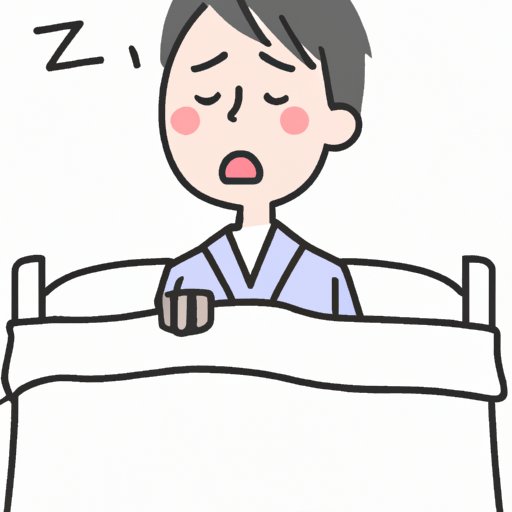
Introduction
Have you ever pulled an all-nighter to meet a deadline or stayed up late binge-watching your favorite show? While occasional late nights may seem harmless, sleep deprivation can have serious consequences for your health and productivity. In this article, we’ll explore the science behind sleep and its impact on our bodies and minds. We’ll also provide tips for staying awake when you need to, but also emphasize the importance of getting enough rest for your health and productivity.
The Importance of Sleep
Sleep is essential for our body’s physical and mental health. When we sleep, our bodies repair and regenerate tissues, strengthen our immune system, and regulate hormones. Our brains also need sleep to process and consolidate information, allowing us to learn and remember new things.
On the other hand, lack of sleep can have negative effects on our health. Research has linked sleep deprivation to a range of health problems, including obesity, diabetes, cardiovascular disease, and depression. Sleep deprivation can also lead to decreased cognitive function, including impaired memory, attention, and decision-making abilities.
Furthermore, sleep quality is just as important as quantity. Poor quality sleep can lead to daytime fatigue, irritability, and difficulty concentrating, all of which can impact productivity.
Pushing Your Limits: How to Stay Awake for 24+ Hours Without Losing Your Mind
There are times when we may need to push our limits and stay awake for extended periods, such as during finals week or when working on a project with a tight deadline. Here are some tips for staying alert when you need to:
- Consuming caffeine: Caffeine can help increase alertness and concentration, but it’s important not to overdo it.
- Physical activity: Light exercise or stretching can help increase blood flow and energy levels.
- Mental exercises: Staying engaged in mentally stimulating activities can help keep your mind active.
While these techniques may help keep you awake, it’s crucial not to make a habit of sleep deprivation. Chronic sleep deprivation can have severe consequences on your health, including long-term cognitive impairment and weakened immune system. It’s essential to prioritize sleep and find a sustainable balance between rest and productivity.
The Risks of Pulling All-Nighters: Why You Shouldn’t Stay Awake for Too Long
Sleep deprivation can have severe consequences on your health and productivity. Pulling frequent all-nighters can lead to impaired cognitive function, decreased productivity, and weakened immune system, among other problems.
While short-term sleep deprivation may not have severe consequences, long-term sleep deprivation can have chronic health effects. It’s crucial to prioritize regular, high-quality sleep to maintain your health and productivity.
If you’re struggling to get enough sleep, there are ways to improve your sleep hygiene, such as creating a consistent sleep schedule, reducing stimulant intake, and creating a sleep-conducive environment. Seeking professional help may also be necessary if you’re struggling with severe sleep problems.
Finding the Sweet Spot: The Optimal Amount of Time to Stay Awake for Productivity and Health
While there’s no one-size-fits-all answer to how long one can stay awake, research suggests that after 16 hours of being awake, cognitive function starts to decline. Sleep deprivation for more than 24 hours can have severe health consequences, including hallucinations, slowed reaction times, and decreased immune function.
It’s important to find the sweet spot for your individual sleep needs. Adults typically need 7-8 hours of sleep per night, but some may require more or less. Experiment with sleep duration until you find the sweet spot that works best for you. Maintaining a consistent sleep schedule and sleep routine can also help improve the quality of your sleep.
The Science of Naps: How a Mid-Day Snooze Can Help You Stay Awake Longer
Short naps can be an effective way to recharge and improve cognitive function. Studies have shown that napping for 20-30 minutes can improve alertness, energy, and creativity, without negatively impacting nighttime sleep.
It’s essential to note that longer naps can have the opposite effect, leaving you feeling groggy and lethargic. It’s also essential to consider the timing of your naps, as napping too close to bedtime can impact your nighttime sleep quality.
While not always possible, incorporating a mid-day nap into your work routine can help you stay alert and productive throughout the day.
Conclusion
Sleep is critical for our physical and mental health and productivity. While there may be times when we need to stay awake for extended periods, it’s crucial to prioritize regular, high-quality sleep. Tips and tricks can help improve alertness when you need to, but it’s essential to avoid chronic sleep deprivation to maintain your overall health and well-being. By prioritizing rest and finding the optimal balance between sleep and productivity, we can enjoy better health and greater productivity in all aspects of our lives.




